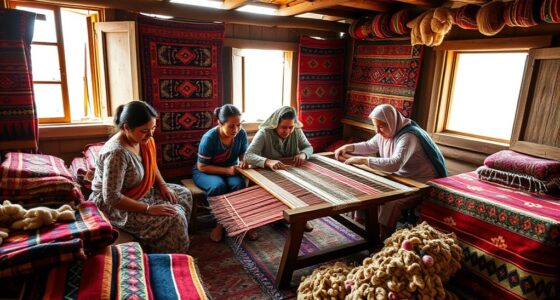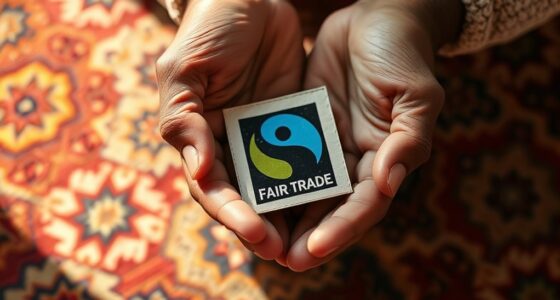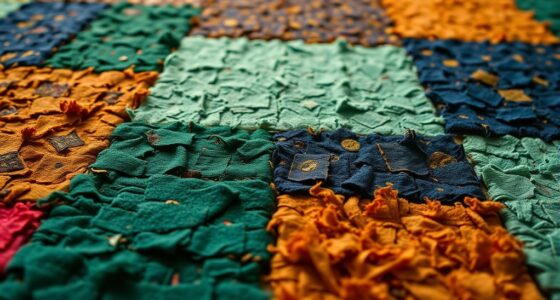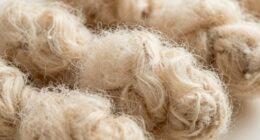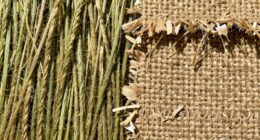Vegan rugs are gaining popularity as stylish, cruelty-free alternatives made from plant-based and recycled fibers like jute, sisal, and polyester. They support eco-friendly practices by reducing reliance on animal products and using fewer resources, making them a responsible choice for your home. These rugs offer diverse designs, durability, and health benefits such as fewer chemicals and improved air quality. To discover how vegan rugs can elevate your space ethically and stylishly, keep exploring further.
Key Takeaways
- Vegan rugs are made from cruelty-free, plant-based, recycled, or synthetic fibers, eliminating animal products.
- They promote ethical manufacturing, supporting fair wages and safe working conditions.
- These rugs are environmentally sustainable, requiring less water, chemicals, and energy during production.
- Vegan fibers offer diverse designs, textures, and durability, suitable for various interior styles.
- They contribute to healthier indoor air quality by avoiding animal-derived dyes and chemicals.
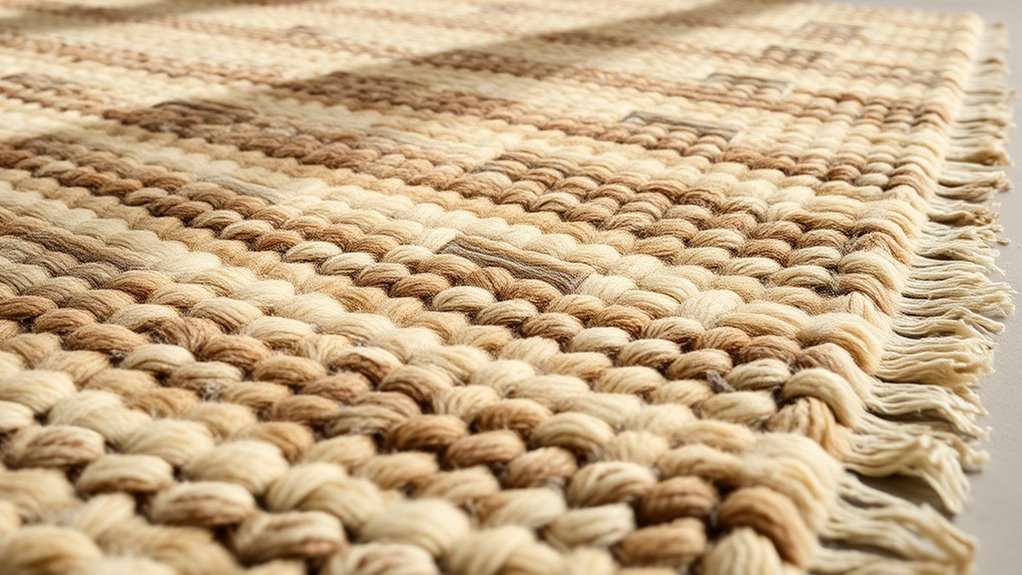
Are you looking for stylish flooring options that align with your ethical values? If so, vegan rugs might be exactly what you need. These rugs are crafted from sustainable alternatives that don’t rely on animal products, making them ideal for anyone committed to cruelty-free living. As more people seek to minimize their environmental impact and promote ethical manufacturing, vegan rugs have gained popularity for their ability to combine beauty, functionality, and conscience. Instead of traditional animal fibers like wool or silk, these rugs use plant-based, recycled, or synthetic fibers that are eco-friendly and cruelty-free. Materials such as jute, sisal, seagrass, and recycled polyester or nylon are common choices, offering durability and style without compromising your values.
When choosing vegan rugs, you’re supporting sustainable alternatives that reduce reliance on animal agriculture, which is a significant contributor to environmental degradation. These fibers often require less water, fewer chemicals, and less energy to produce compared to traditional animal-based options. Plus, many brands prioritize ethical manufacturing practices, ensuring fair wages and safe working conditions for their workers. This commitment to ethical manufacturing means you’re not only choosing a product that aligns with your morals but also encouraging responsible production methods across the industry.
Vegan rugs are versatile and come in a broad array of designs, textures, and colors, allowing you to find options that suit your aesthetic preferences. Whether you prefer a modern, minimalist look or something more bohemian and eclectic, there’s a vegan rug to match your style. Their innovative use of sustainable alternatives often results in unique textures and patterns that add character to any space. Plus, because they’re made from durable fibers, these rugs tend to last a long time, making them a practical investment for your home. Additionally, understanding asset division laws can help you navigate legal aspects if you’re considering the financial implications of your purchase or related decisions.
Another compelling reason to choose vegan rugs is their health benefits. Since they’re free of animal-derived dyes and chemicals often used in traditional rug manufacturing, they tend to be less polluting and better for indoor air quality. This makes them an excellent choice if you’re sensitive to strong odors or have allergies.
In essence, vegan rugs offer a way to express your style while staying true to your ethical principles. By opting for sustainable alternatives and supporting brands that prioritize ethical manufacturing, you can create a beautiful, conscious space in your home. These rugs prove that you don’t have to compromise aesthetics for ethics—they’re a stylish, responsible choice for anyone committed to making a positive impact.
Frequently Asked Questions
Are Vegan Rugs as Durable as Traditional Rugs?
Yes, vegan rugs can be just as durable as traditional rugs. Synthetic fibers used in vegan rugs offer excellent synthetic durability, resisting stains and wear over time. Additionally, many vegan rugs are made from natural fibers that emphasize sustainability, ensuring they hold up well with proper care. You’ll find that these eco-friendly materials provide both longevity and a cruelty-free alternative, making them a practical choice for your space.
How Do Vegan Fibers Compare in Cost?
Vegan fibers often cost less than traditional materials like wool or silk, making them a more affordable option overall. Your cost comparison shows that vegan rugs typically have lower prices due to the affordability factors involved in producing synthetic or plant-based fibers. While some premium vegan options might be pricier, generally, you’ll find vegan fibers offer a budget-friendly alternative without sacrificing style or durability.
Can Vegan Rugs Be Cleaned Easily?
Cleaning vegan rugs is like giving your favorite sneakers a quick refresh—you can do it easily. Use gentle cleaning tips like vacuuming regularly and spot stain removal with mild soap and water. For tougher stains, a vinegar solution often does the trick. Vegan fibers are generally durable and stain-resistant, making maintenance straightforward. With consistent care, your eco-friendly rug stays fresh and vibrant, just like your favorite pair of sneakers.
Are Vegan Rugs Suitable for Outdoor Use?
Yes, vegan rugs are suitable for outdoor use because they offer good outdoor resilience and weather resistance. You can place them on patios or decks, knowing they’ll withstand sun, rain, and other elements. Their durable fibers resist fading and damage, making maintenance easier. Just make certain you clean them regularly to maintain their appearance and longevity, and you’ll enjoy a stylish, eco-friendly outdoor space year-round.
What Are the Most Popular Vegan Rug Materials?
Think of your rug as a canvas of sustainability. The most popular vegan rug materials include synthetic fibers like polyester and nylon, which mimic traditional textiles without harm. Plant-based textiles like jute, sisal, and hemp also lead the way, offering eco-friendly options that align with cruelty-free values. These materials symbolize a commitment to kindness and environmental care, making your space both stylish and conscientious.
Conclusion
As you explore the world of vegan rugs, you’re stepping into a future where cruelty-free fibers lead the way. By making conscious choices, you’re not just decorating your space—you’re making a statement that kindness and sustainability go hand in hand. Remember, every small change can make a big splash. So, don’t just sit on the fence; embrace these innovative materials and let your home reflect your values. It’s a win-win situation all around.


